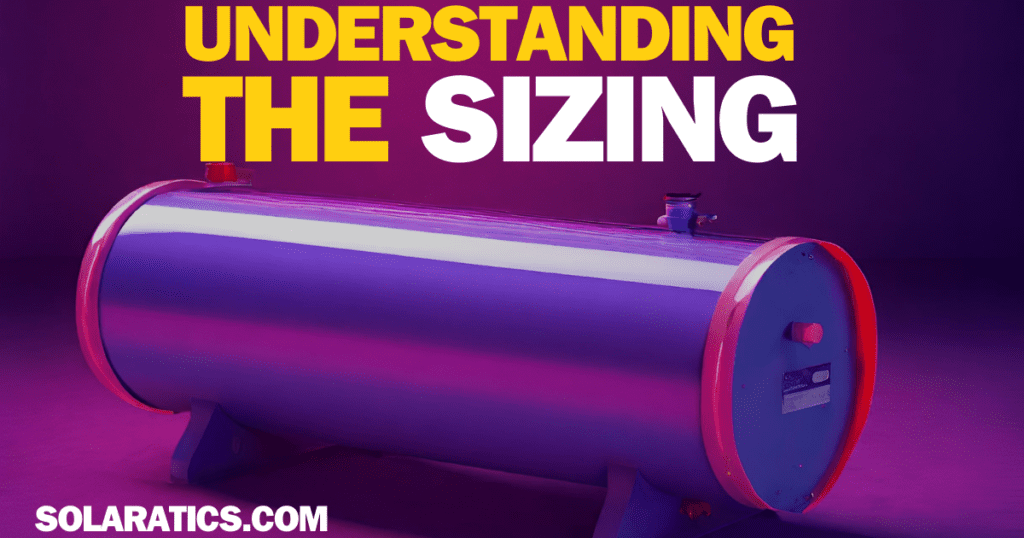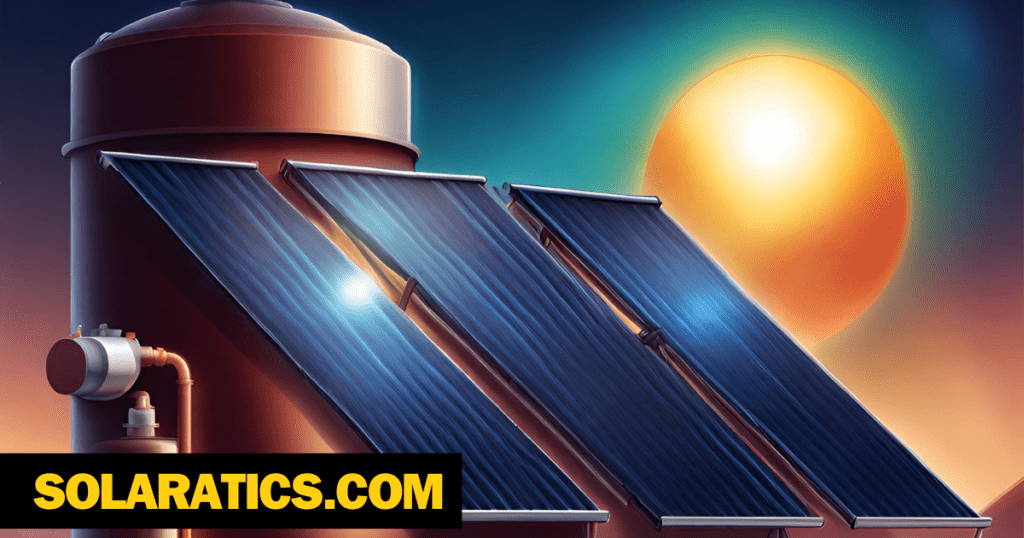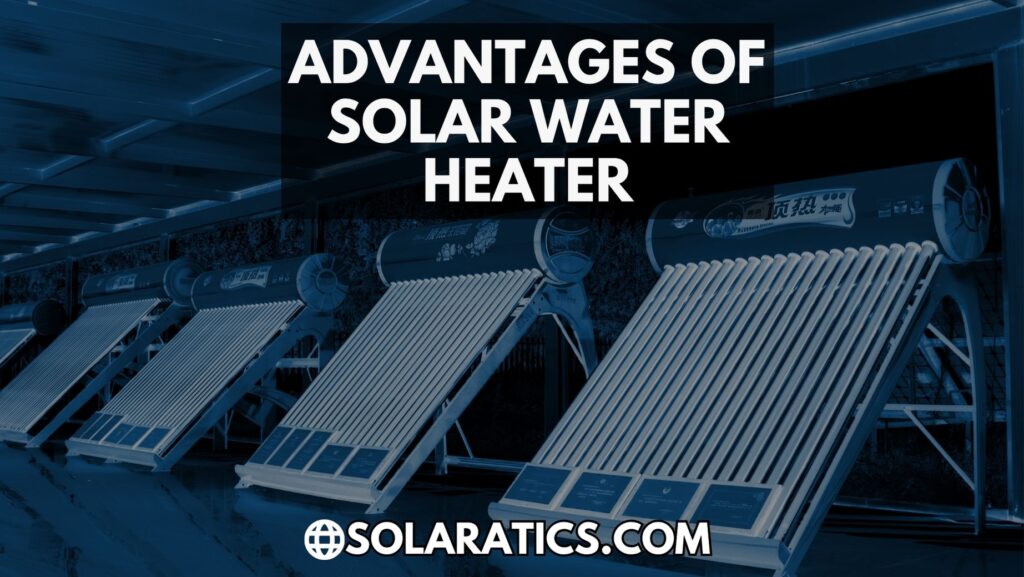Solar Water Heater Size and capacity: the Perfect Fit for Your Home

Heat your water for less money and less of an impact on the environment with a solar water heater. It’s important to calculate how much hot water you need every day before installing a solar water heater. Let’s find the best solar water heater for you.
A solar water heater, also known as a solar geyser, uses solar energy to heat water, reducing reliance on conventional energy sources. It typically involves solar collectors (panels or tubes) on a roof that capture sunlight and transfer the heat to a liquid, which then warms the water in a storage tank.
solar water heater
This section will introduce solar water heaters, analyse the elements that affect sizing, and provide an overview of the sizing method.
Solar Water Heating Systems
There are two types of active solar water heating systems:
- Direct circulation systems
Pumps circulate household water through the collectors and into the home. They work well in climates where it rarely freezes. - Indirect circulation systems
Pumps circulate a non-freezing, heat-transfer fluid through the collectors - and a heat exchanger. This heats the water that then flows into the home. They are popular in climates prone to freezing temperatures
- Passive Solar Water Heating Systems
- There are two basic types of passive systems:
- Integral collector-storage passive systems
- Thermosyphon systems.
How Do They Work?
The solar collector panel, a key component of the solar water heating system, captures the Sun’s rays. Within the collectors, a black absorbing surface (absorber) absorbs solar radiation and transfers the resulting heat energy to the flowing water. The heated water accumulates in an insulated tank to prevent heat loss.
The circulation of water from the tank through the collectors and back is automatic, facilitated by the thermo-siphon system. Solar water heaters come in two types based on the collector system. They typically consist of a collector for gathering solar energy and an insulated storage tank for storing the heated water. This stored hot water is readily available for use at any time.
The collector area needed to produce the specified amount of hot water is normally determined during the sizing phase. The collector area is the entire amount of solar panels used to collect sunlight.
It all depends on how much heat the sun can provide, how efficient the solar collector is, and how hot you want the water to get.
How do you calculate solar water Capacity?
The capacity of a solar water heater is calculated by multiplying the storage tank volume by the water density and the temperature change.
The formula is:Capacity = Density × Volume × ΔT
where:
-Density is the density of water, which is approximately 62.4 pounds per cubic foot or 1000 kilograms per cubic meter.
-Volume is the volume of the storage tank in cubic feet or cubic meters.
-ΔT is the change in temperature of the water, which is typically 80°F or 27°C.
For example, a 50-gallon storage tank would have a capacity of approximately 2,500 BTU/hr.
Common Solar Water Heater Sizes
| Tank Capacity | Best For | Collector Area |
|---|---|---|
| 40-60 gallons | Small homes or couples | 20-30 sq. ft |
| 60-80 gallons | Families of 3-4 | 30-40 sq. ft |
| 80-120 gallons | Large families or high demand | 40-60 sq. ft |
Understanding Solar Water Heater Sizing

The appropriate size and capacity of a solar water heater
depends on the number of people in the household and their hot water usage patterns. Generally, a family of 2-3 people will need a 120-150 liter system, while a family of 4-5 people will need a 200-250 liter system, and so on. Larger systems can be used for commercial purposes, like hotels or restaurants.
Solar water heater sizing also involves thinking about the backup heating system (if any), the size of the water tank, and the kind of collector (flat plate or evacuated tube).
Each person’s tastes, the local weather, and their financial situation are all potential variables in this regard.
Sizing the solar water heater is an important step in developing a system that can provide you with hot water efficiently and effectively.
The optimal use of solar energy is achieved by meeting the hot water needs of a home or business with a system that is properly sized.
The following considerations are necessary for proper solar water heater sizing:
Need For Hot Water
Finding out how much hot water is used daily is the first step in selecting the right size solar water heater. This can be determined by factors such as the size of the home or the needs of the business.
The size of the solar water heater required to meet this requirement will vary depending on the hot water demand.
Energy From The Sun
Sizing a solar water heater depends heavily on the amount of available solar resources in a given region. Smaller systems will be needed in places with higher amounts of solar radiation.
While larger systems may be needed in regions with lower levels of solar radiation to make up for the lower energy intake. Climate, latitude, and shade all play a role in the availability of the sun’s energy.
Space For Collecting
The collector area stands in for the whole exposed surface of the solar panels. It all depends on how much heat the sun can provide. How efficient the solar collector is, and how hot you want the water to get.
The collector area needed to supply the hot water demand must be calculated as part of the solar water heater sizing process.
The Capacity of Storage
Another crucial factor is the capacity of the water tank. It needs to be big enough to keep the solar system‘s hot water stored during times of low solar radiation or high hot water demand.
Storage capacity is affected by variables like population, water consumption habits, and tank size.
Emergency Heater
During times of low solar radiation, a solar water heater may have a backup heating system, typically an electric or gas heater. Together, the solar water heater size and the backup system’s sizing may provide a constant supply of hot water.
Solar water heater sizing is a complex process that calls for skill and knowledge.
To get the right size for your home based on climatic data and local restrictions. And for your needs, it’s best to consult a specialist or solar water heater manufacturer.
Calculating Solar Water Heater Size

For a solar water heater to efficiently supply a home or business with hot water, its size must be determined using a multi-step process. This is a high-level summary of the steps involved:
1- Determine Hot Water Demand
The first step is to calculate the typical daily use of hot water. Think about the number of people living there and how often they shower. How often do they do dishes, laundry, and other hot water uses? You can calculate the daily demand for hot water in this way.
2- Solar Resource Evaluation
Consider the potential of solar energy in your area. Shade, temperature, and other environmental elements are included in this category.
Solar maps and regional climatic information can help you assess the viability of solar power in your location.
3- Calculate Collector Area
The amount of collector area needed to heat the water to the desired temperature is based on three factors: the amount of available solar radiation, the efficiency of the solar collector, and the target temperature.
The collector area should be between 50 and 75 percent of the total daily hot water requirement. To achieve precision, however, one should run comprehensive calculations via software or seek expert advice.
4- Capacity Evaluation
The duration of low solar radiation or high hot water usage may be predicted, and this information is used to determine the optimal size of the storage tank.
The standard recommendation is 20-30 gallons of storage space per person. However, it is important to take into account the individual requirements of the home or business.
To maintain a steady supply of hot water even during times of low solar energy, it is crucial to have sufficient storage.
5- Consider Backup Heating
Determine if a secondary heating source is required to augment the solar water heater on cloudy days. An electric or gas heater would work for this backup system.
If a secondary heating system is provided, it must be large enough to keep water hot even if solar power isn’t available.
6- Consult Professionals
Solar water heater size can be tricky since it has to account for various variables, including weather, collector efficiency, and individual needs.
Professionals, such as solar installers or manufacturers, may evaluate your demands and make educated guesses about the size of the system you should choose.
By following these guidelines and consulting an expert, you can make sure your solar water heater size is appropriately designed to effectively satisfy your hot water demands, cut down on energy expenditures, and lessen your dependency on traditional energy sources.
New Technology & Efficiency Improvements (2025)
Solar water heaters have become more efficient in recent years. Here are some latest trends:
✅ Smart Solar Water Heaters – Some models now come with Wi-Fi controls to monitor and adjust temperature remotely.
✅ Hybrid Systems – Combine solar with electric/gas backup for cloudy days.
✅ Better Insulation – Newer tanks lose less heat, saving more energy.
Factors That Determine Solar Water Heater Size
1. Household Size and Water Usage
The number of people in your home directly impacts hot water needs. On average, each person uses 20-30 gallons of hot water daily.
| Household Size | Recommended Solar Heater Size |
|---|---|
| 1-2 people | 40-60 gallons |
| 3-4 people | 60-80 gallons |
| 5+ people | 80-120 gallons |
2. Climate and Sunlight Availability
Solar heaters in sunny regions (e.g., Arizona, California) require smaller systems than those in cloudy areas (e.g., the Pacific Northwest).
3. Type of Solar Water Heater
- Active Systems: Use pumps and need larger storage tanks.
- Passive Systems: Rely on natural convection and may require smaller tanks.
4. Backup Heating Needs
If you need a gas/electric backup for cloudy days, factor this into your system size.
Advantages of Solar Water Heater
The numerous benefits of solar water heaters have made them a well-liked and eco-friendly option for this purpose. Some of the major benefits of solar water heaters include:

Renewable And Long-Lasting
The sun provides an abundant source of clean, renewable energy. By heating water with solar panels instead of burning fossil fuels, you can help the environment and cut down on your carbon footprint.
Save thousands of dollars
You can save thousands of dollars annually on utility bills by installing a solar water heater. The average homeowner can save around $1,500 per year on electricity bills after installing solar panels, which can translate to savings of $50,000 or more over the system’s lifespan. However, the exact amount of savings will vary based on factors like location, climate, energy usage, and available incentives.
Reduced Expenses
While solar water heaters can have a greater initial investment cost, they can have much lower operating costs over time. Sunlight is used by installed solar water heaters at no cost. In the long run, this can help you save a lot of money on your energy bills.
Cost vs. Savings: Is It Worth It?
- A typical solar water heater costs 2,000−2,000−5,000 (after incentives).
- It can reduce water heating bills by 50-80%, saving 200−200−500 per year.
- Payback period: 4-8 years, depending on usage and sunlight.
*According to the U.S. Department of Energy, a solar water heater can last 20+ years with proper maintenance.*
Conservation of Energy
Solar water heaters save a ton of money on utility bills. In comparison to traditional water heaters, they have a smaller impact on the environment due to the high percentage of solar energy they convert into heat.
This effectiveness aids in decreasing both energy use and carbon output.
Lessening Reliance on Fossil Fuels
Because they don’t rely on the grid or any kind of gas supply, solar water heaters are a safe bet even in places where electricity is unreliable or when blackouts occur. This can be especially helpful in outlying areas or places with sketchy power grids.

environment friendly
Extremely Durable
With regular upkeep, solar water heaters are built to last for decades. They have a longer lifespan than conventional water heaters and require fewer repairs due to their low maintenance and dependence on natural energy.
Improve your carbon footprint
Solar water heating uses renewable energy and reduces your reliance on fossil fuels for heating. This helps improve your home’s carbon footprint.
Advantages For The Environment
Greenhouse gas emissions and other forms of pollution can be mitigated with the use of solar water heaters. They lessen the need for fossil fuels and the carbon footprint of conventional water heating systems by harnessing the sun’s energy.
Subsidies From The Government
To encourage the use of solar water heaters, several national and municipal governments provide financial incentives in the form of tax credits and rebates.
These rebates and Solar tax credits reduce the outlay required to install solar water heating systems in homes and businesses.
Versatility
Solar water heaters are available in a wide range of sizes and shapes, making them easy to set up in a variety of locations. They’re great for both new construction and retrofitting, so they may be used anywhere from private residences to public structures.
Important Factors of Installation
Several factors must be taken into account for successful solar water heater installation. Important installation factors include:

Position And Perspective
You should put the solar water heater in a spot where it will get plenty of sunlight all day long, ideally facing south (in the northern hemisphere) or north (in the southern hemisphere). Make sure that there aren’t any buildings, trees, or other obstructions in the way of the sun.
Applicability To Roof
Determine if the roof is in good enough shape to hold the solar water heating system. Verify the roof’s integrity and capacity to support the extra weight. Get an expert’s opinion on the roof’s stability, and then strengthen it if needed.
Angle And Tilt
Solar collectors or panels should have a tilt and angle that is best suited to the local climate. To maximise solar energy absorption, the optimum tilt angle is often the same as the latitude of the installation site.
However, a different tilt angle may be recommended for improved performance based on the specifics of the situation.
If you want to know the ideal tilt and angle for your solar panels, you can talk to a specialist or look at the regulations in your area.
Pipes And Drains
For the solar water heater to work effectively, it is essential that the pipes and plumbing are installed correctly. Reduce heat loss by making sure plumbing connections are adequately sized and insulated.
To prevent hot water from cooling down during distribution, invest in high-quality pipe insulation.
Size of The System
Consider your household or building’s hot water needs while deciding on the solar water heater system’s size. Consider the number of people living there, how often they use hot water, and the weather trends.
It is important to consult a specialist when determining the appropriate system size because doing so can affect the system’s efficiency and performance.
Storage Tank And Heat Exchanger
The quantity of hot water needed will determine the size of the heat exchanger and the storage tank. For the solar collectors to effectively heat the water in the storage tank, a heat exchanger is required.
The insulation of the water tank is crucial for keeping the water hot for extended periods.
Concerns About Security
Take all necessary precautions during the installation process. To avoid injuries from over-pressurisation or scalding, it is possible to install pressure-release valves, temperature sensors, and anti-scald devices.
Be sure to abide by all applicable municipal ordinances and construction laws for maximum safety.
Access For Repairs
Take into account how simple it will be to perform routine servicing and maintenance on the solar water heating system. Valves, sensors, and collectors should be within easy reach for routine maintenance and repairs.
Trained Technicians Install

Solar water heater systems are complex, therefore, it’s best to have a professional installer or contractor handle the installation. If they are hired, the system will be set up correctly, the plumbing will be connected properly, and local codes will be followed.
Common Mistakes When Choosing a Solar Water Heater
Ignoring Local Climate – Cloudy areas need bigger systems.
Wrong Tank Size – Too small = no hot water; too big = wasted energy.
Poor Installation – Always hire a certified solar installer
We get hot water throughout the year?
The system works all year round. However, because the amount of solar energy varies throughout the year, it’s unlikely to meet 100% of your hot water needs, especially during the winter months.
For example, in the summer, it should provide around 90% of your hot water requirements, dropping to around 25% in the winter.
You can use a boiler or immersion heater to make up the difference.
Final Tips Before Buying
✔ Check Government Rebates – Many countries offer tax credits for solar water heaters.
✔ Compare Brands – Look for warranties (at least 10 years).
✔ Get a Professional Assessment – An expert can recommend the best size for your home.
Conclusion
In conclusion, a solar water heater’s performance and efficiency are greatly enhanced if its size is properly determined. The proper size can be chosen for your needs by considering things like hot water demand, climate, and system sizing guidelines.
You should talk to a professional or solar water heater installer who can figure out how much hot water you use and how big of a system you need.
When deciding on the best size, they should take into account the number of people who will be using it as well as the local climate and any other criteria.
Also Explore: How to Cook with Solar Power Using a Solar Oven OR Impact of Solar Energy on Local Economies
FAQS About Solar Water Heater Sizing
The size of the solar water heater you need depends on several factors, including the size of your household, your hot water usage, and your climate.
A general rule of thumb is to allow 20 square feet of collector area for the first two people in your household. and 8 square feet for each additional person.
For example, a family of four would typically need a solar water heater with at least 24 square feet of collector area.
The capacity of a solar water heater is measured in gallons or litres. The capacity of the tank should be large enough to meet your hot water needs on cloudy days or when you have a high demand for hot water.
A general rule of thumb is to allow 1.5 gallons of storage per square foot of collector area. For example, a solar water heater with 24 square feet of collector area would typically need a tank with at least 36 gallons of capacity.
A family of four would typically need a solar water heater with at least 24 square feet of collector area and a tank with at least 36 gallons of capacity. However, the actual size of the system you need will depend on your specific needs and climate.
